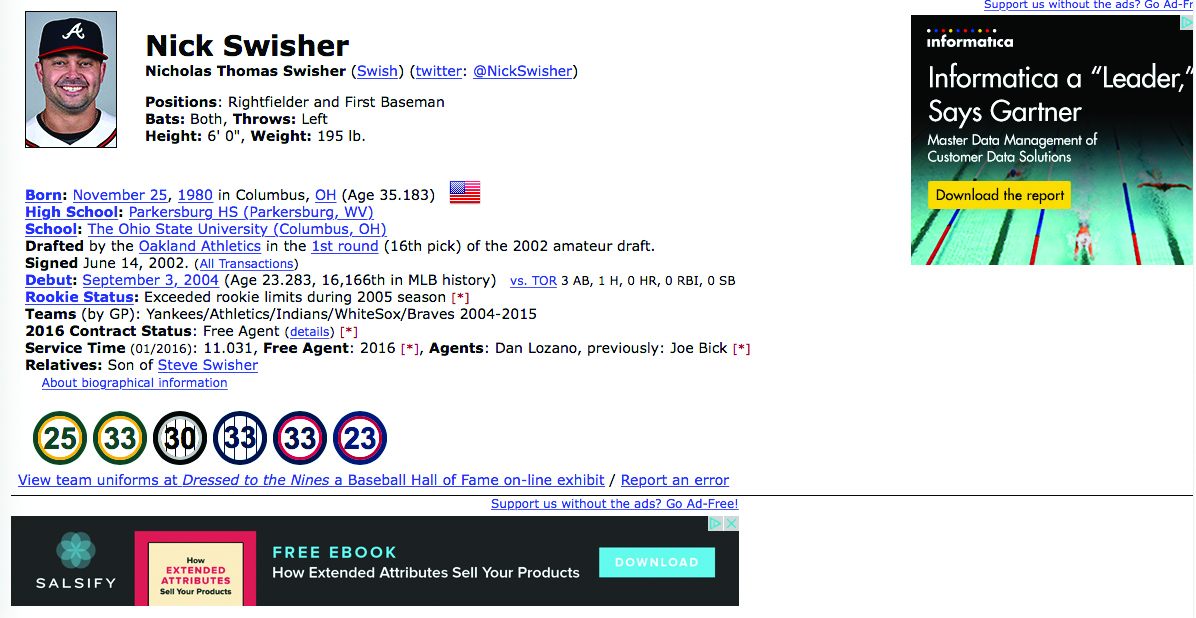Column: Rethinking Retargeting
Help, I’m being stalked by a pair of business-to-business advertisers!
As I checked out Weather.com one day in May to see if the impending spring thunderstorms would coincide with my flight home from O’Hare (they did, as usual), I was fed display ads from two technology companies specializing in product information management.
A few days later, there I was, innocently looking up statistics on Baseball-Reference.com, and there they were again – the same two advertisers. They kept popping up wherever I went, sometimes together and sometimes separately, for what seemed like far too long: I revisited Weather.com as I wrote this column on June 10 and one of them was still lurking.

Why has this happened? Well, because I visited the websites of these companies a few times in March and April while researching this month’s feature story on digital asset management. But that only provides the literal answer to my question. I’m still left seeking an answer to the more metaphysical question, “Why is this happening to me?”
First off, let me say that I don’t mean to specifically malign either of the two companies in question here. (In fact, they would have gone entirely unidentified if we didn’t need related artwork for the page design.) They’re simply following a commonplace advertising practice: According to marketing services company Wishpond, roughly half of the top consumer brands have a dedicated budget for retargeting. I shop for pool supplies on Walmart.com every spring, and then wind up tailed by related ads until about Labor Day. Amazon.com, too, seems to have picked up its efforts to trail me recently – sometimes for products I don’t even remember viewing.
And there is plenty of data pointing to retargeting’s effectiveness: Wishpond says website visitors are 70% more likely to convert if they’re exposed to retargeted ads. So I’m not knocking the whole concept outright. I’m just wondering if there should be a little more thought devoted to the execution.
Among the promises of digital technology is the ability to facilitate more targeted, more precise and more personal marketing communication that will better engage consumers and drive not only sales but also brand loyalty. Retargeting is, by definition, targeting. But the way it’s so often executed these days, it’s not very precise and it most definitely is not personal.
Path to Purchase Leadership University’s “Digital Shopper Marketing” course describes the solution to this issue as the need for contextual relevance: ensuring that the marketing communication not only reaches the right target, but also is delivered at the right place and the right time. Otherwise, your ad might be about as welcome as a dinnertime telemarketer.
So, in this instance, even if I might actually be in the market for product information management services, is a weather check on a mainstream consumer website the right place and time, the right contextually relevant occasion, in which to hit me with an ad? As it turned out that night, an ad for Wolfgang Puck’s in Terminal 3 would have been an incredibly relevant offer (thanks to a four-hour delay). But a B2B data solution? Not really.
As a younger man, I always held out hope that a smile and a friendly hello implied that the young lady I’d encountered might be interested in a longer, meaningful interaction. This hope, as you might guess, almost never aligned with reality.
Similarly, the sole fact that I’ve visited a website shouldn’t suggest that I’m interested in buying whatever is sold there. Was I knocking on the door of your tobacco store because I wanted cigars or because I needed directions? You probably should know the answer before you chase me back to the car waving a box of Macanudos.
It’s also a matter of volume, too. Getting the occasional incongruous ad wouldn’t be a big deal if it didn’t happen numerous times over the course of weeks or even months. Familiarity, in this case in the form of the same ad ad nauseum, really does breed contempt.
To be fair, I’ve also encountered ads from these two companies on a few technology news websites. That’s a much more relevant place to be – and I very possibly could still have been in a product information management frame of mind. In that context, they can keep hitting me with ads for as long as they’d like.
But it’d be a shame if retargeting became so obnoxious that it started changing shopper behavior in a negative way: driving consumers to avoid websites that employ retargeting too aggressively – or maybe even the sites that allow it too often. Hmm. Maybe I should give Yahoo! Weather a try.
Never mind: I just tried Yahoo! Weather and was hit with an Amazon ad for All-Clad cookware. I searched that brand on Amazon last week while wrapping up this month’s story.

